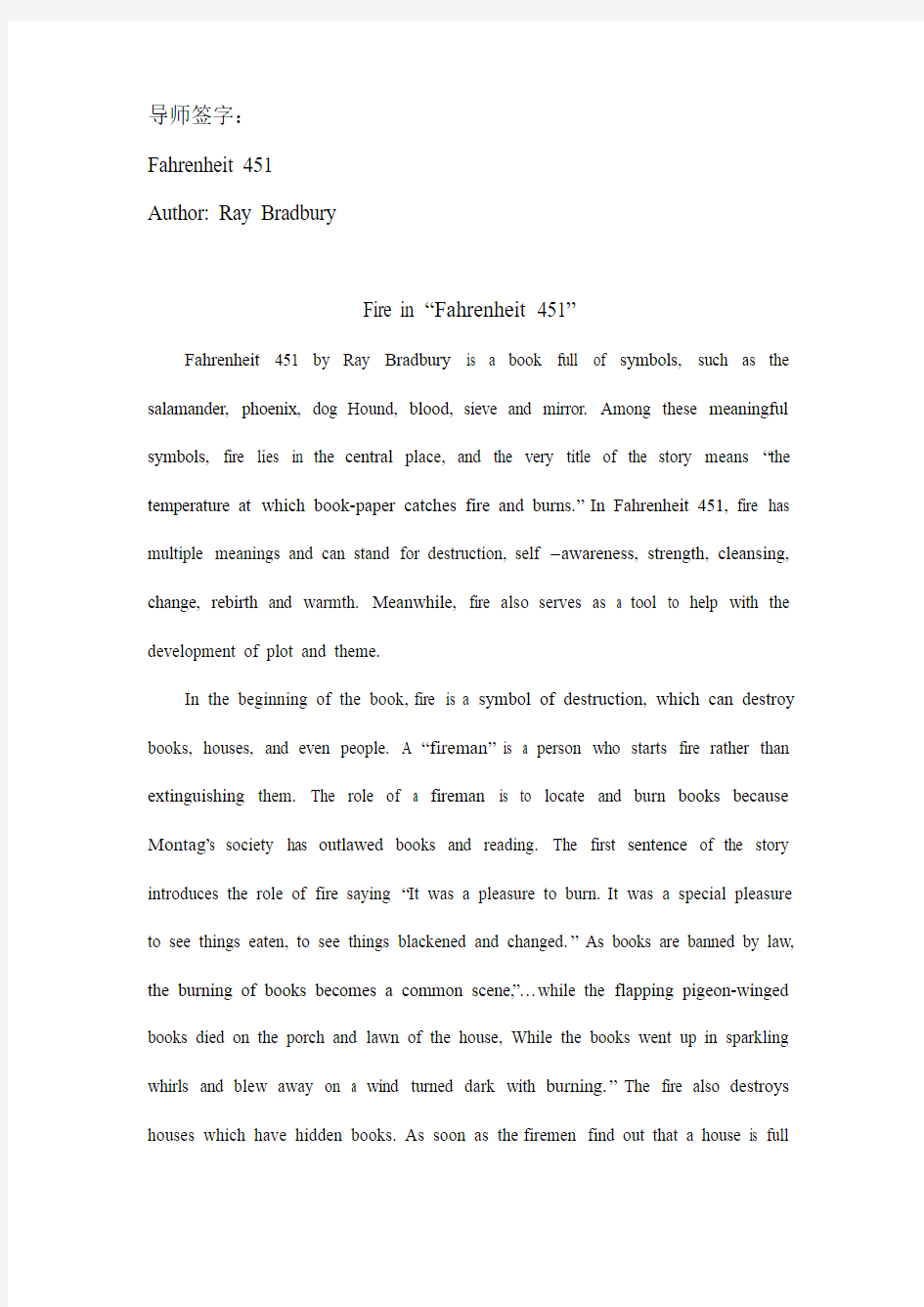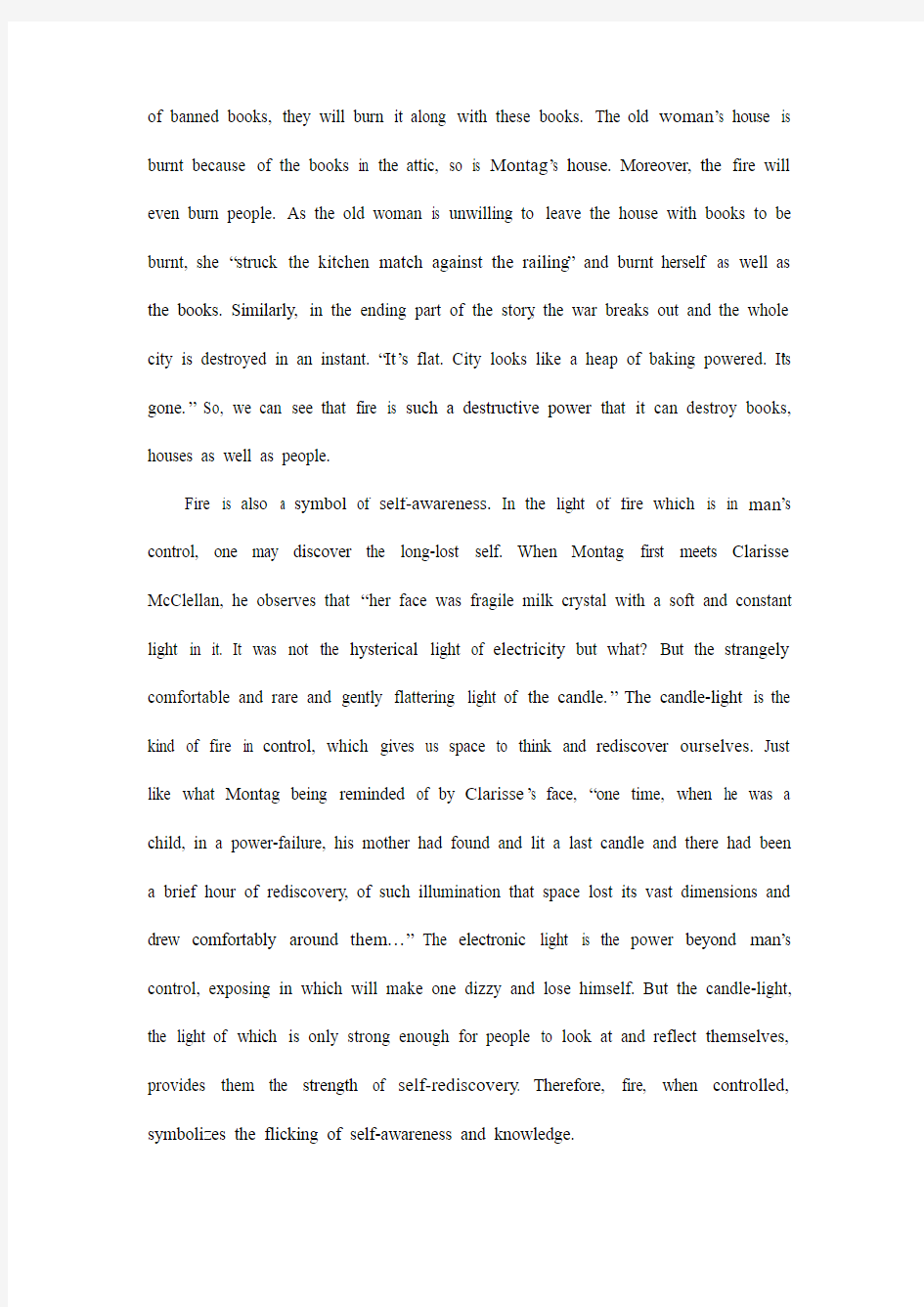Fehrernheit 451


导师签字:
Fahrenheit 451
Author: Ray Bradbury
Fire in “Fahrenheit 451”
Fahrenheit 451 by Ray Bradbury is a book full of symbols, such as the salamander, phoenix, dog Hound, blood, sieve and mirror. Among these meaningful symbols, fire lies in the central place, and the very title of the story means “the temperature at which book-paper catches fire and burns.”In Fahrenheit 451, fire has multiple meanings and can stand for destruction, self –awareness, strength, cleansing, change, rebirth and warmth. Meanwhile, fire also serves as a tool to help with the development of plot and theme.
In the beginning of the book, fire is a symbol of destruction, which can destroy books, houses, and even people. A “fireman”is a person who starts fire rather than extinguishing them. The role of a fireman is to locate and burn books because Montag’s society has outlawed books and reading. The first sentence of the story introduces the role of fire saying “It was a pleasure to burn. It was a special pleasure to see things eaten, to see things blackened and changed.” As books are banned by law, the burning of books becomes a common scene,”…while the flapping pigeon-winged books died on the porch and lawn of the house, While the books went up in sparkling whirls and blew away on a wind turned dark with burning.”The fire also destroys houses which have hidden books. As soon as the firemen find out that a house is full
of banned books, they will burn it along with these books. The old woman’s house is burnt because of the books in the attic, so is Montag’s house. Moreover, the fire will even burn people. As the old woman is unwilling to leave the house with books to be burnt, she “struck the kitchen match against the railing” and burnt herself as well as the books. Similarly, in the ending part of the story, the war breaks out and the whole city is destroyed in an instant. “It’s flat. City looks like a heap of baking powered. It’s gone.” So, we can see that fire is such a destructive power that it can destroy books, houses as well as people.
Fire is also a symbol of self-awareness. In the light of fire which is in man’s control, one may discover the long-lost self. When Montag first meets Clarisse McClellan, he observes that “her face was fragile milk crystal with a soft and constant light in it. It was not the hysterical light of electricity but what? But the strangely comfortable and rare and gently flattering light of the candle.”The candle-light is the kind of fire in control, which gives us space to think and rediscover ourselves. Just like what Montag being reminded of by Clarisse’s face, “one time, when he was a child, in a power-failure, his mother had found and lit a last candle and there had been a brief hour of rediscovery, of such illumination that space lost its vast dimensions and drew comfortably around them…”The electronic light is the power beyond man’s control, exposing in which will make one dizzy and lose himself. But the candle-light, the light of which is only strong enough for people to look at and reflect themselves, provides them the strength of self-rediscovery. Therefore, fire, when controlled, symbolizes the flicking of self-awareness and knowledge.
Sometimes fire represents strength. The fire-light gives the people who believe in it the strength to resist the worldly oppression and help them achieve a state of permanence. The woman whose house is being burnt by the firemen mummers: “Play the man, Master Ridley; we shall this day light such a candle, by God’s grace, in England, as I trust shall never be put out.” For her, the fire represents strength. It gives her strength to reject the authority. And when she knows that she has no power to protect the books, she chooses not to leave, burning herself together with the books. This event shocks the firemen enormously, “they said nothing on their way back to the firehouse. Nobody looked at anyone else,” and “they did not even smoke their pipes. They sat there looking out of the front of the great salamander as they turned a corner and went silently on.”It is also an important element that pushes Montag taking actions to change his life. To the woman, the fire represents strength to surpass herself and at the same time make the authorities reflect themselves about their misdeeds.
The fire is also used by both the firemen and the people fighting against them as a symbol of cleansing, but they are each hoping to cleanse different things. Captain Beatty and the firemen want to use fire to cleanse the world of knowledge, a thing that they think is evil. They want to use fire to erase people's memories and problems. That is why Captain Beatty thinks people should be cremated after they are dead. Captain Beatty believes that fire can destroy anything and make problems disappear. When he explains that cremation is important to make people forget the dead, he says that they should “Forget them. Burn all, burn everything. Fire is bright and fire is clean”. He thinks that the only way to have a peacefully and happy society is to make
people forget the past and ignore or forget anything that they do not like. Captain Beatty also says that burning books can help people get along. He says that if African American and White people feel offended by different books, then you should burn the books so they will not be offended and they will no longer disagree with each other: “Colored people don’t like Little Black Sambo. Burn it. White people don’t feel good about Uncle Tom’s Cabin. Burn it. Someone’s written a book on tobacco and cancer of the lungs? The cigarette people are weeping? Burn the book.” When Montag sets Captain Beatty on fire he also wants to cleanse society of something he thinks is evil. Montag thinks that burning books is evil and Captain Beatty symbolizes the society of burning books. Montag also burns Captain Beatty to cleanse himself because he knows he has been doing something wrong all along by being a fireman and burning books. Montag has to kill Captain Beatty because the Captain is going to kill him. He also wants to do it to try to make up for what he has done by burning Captain Beatty so that the Captain cannot burn anymore books. So people use fire to cleanse the things that they think should not exist.
Throughout the story, fire is used to symbolize change and rebirth. When people want to change something, they burn it and then create something new. When Montag decides to change, he burns two things, his house, and Captain Beatty. Fire represents change in the scene where he aims the flamethrower at Captain Beatty and sets him on fire, killing the captain and allowing Montag to escape. Fire allows for change because without the use of fire, Montag would not have been able to escape. At the same time, after he sets fire to his house and to Captain Beatty, Montag has no choice
but to change his life because there is no way to go back. Also, the city is burnt in the war. Just like what Granger puts it, “there was a silly damn bird called a phoenix back before Christ: every few hundred years he built a pyre and burned himself up. He must have been first cousin to Man. But every time he burnt himself up he sprang out of the ashes, he got himself born all over again.”The phoenix dies in fire when it is old and then is born in the same fire, so fire can symbolize rebirth. Even though Granger does not think burning books is a good thing, he hopes that society will eventually realize what it has done wrong and a new time will come when they will value knowledge and reading again.
In the latter part of the story, after Montag swims across the river, fire becomes a symbol of warmth, and it is comforting and friendly. When Montag finally gets to Granger's camp with the book people, he first sees them all sitting around a campfire warming their hands. Here the fire is not burning but warming. “He hadn’t known fire could look this way. He had never thought in his life that it could give as well as take. Even its smell was different.” The people sitting around it are members of a group that is trying to save old knowledge from books and they are using an old method of staying warm and cooking food. From the fire we can sense the real humanity. However, they are book-burners, too. They read books and burn them. But that’s because they are afraid of being found. And before the burning, they have all kept the contents of the books in the heads, and “all we want to do is keep the knowledge we think we will need, intact and safe.” Their burning of books is not destruction, but out of their kindness to the human beings. So, in their society, fire is a symbol of warmth.
From the changing meanings of fire in Fahrenheit 451, that is, from destruction to self-awareness and strength, then becoming cleansing, change and rebirth, at last becoming a symbol of warmth, we can see a clear development of plot and theme. Therefore, with its changing meanings and functions, fire can be seen as the most significant symbol in the story of “Fahrenheit 451”.
